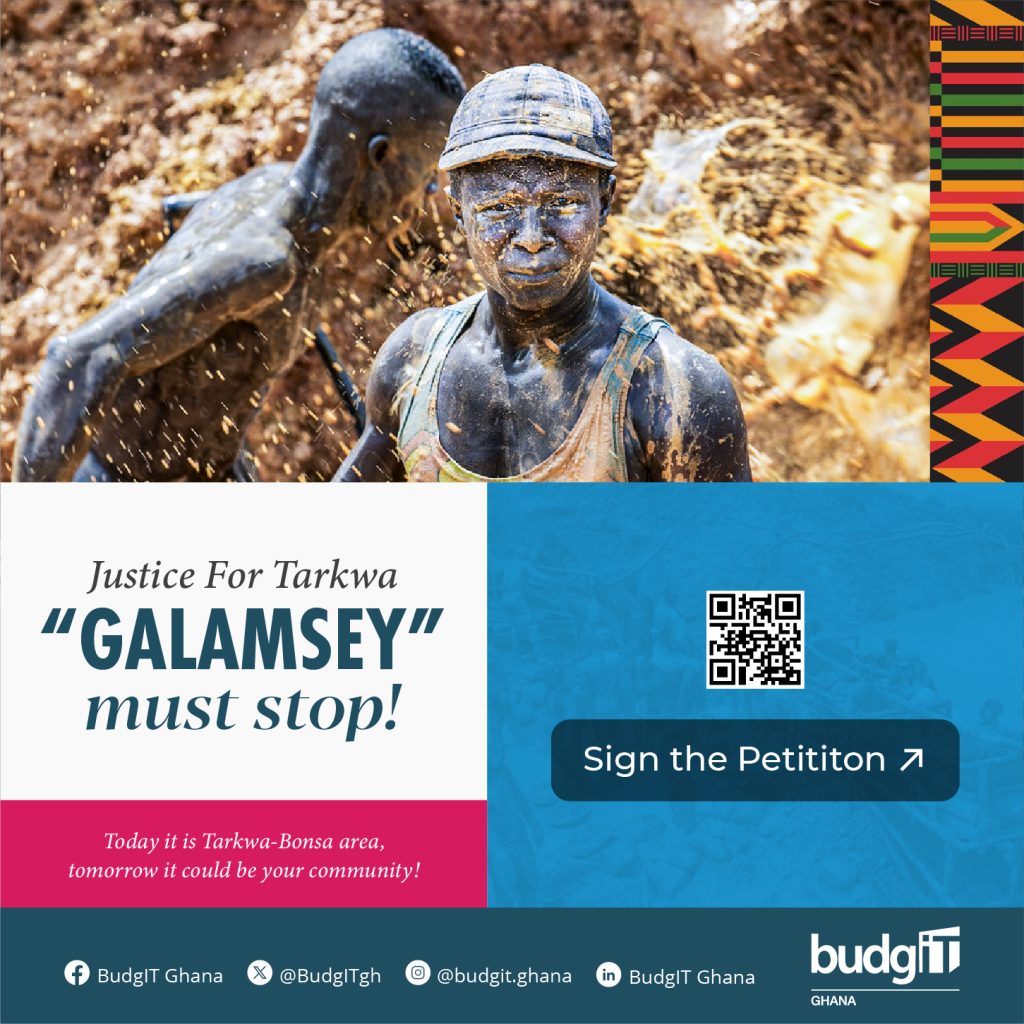For Immediate Release
Immediate Action Required: BudgIT Ghana Urges President Mahama to Combat Galamsey Crisis Amid Water Shortage in Tarkwa
Accra, Ghana, January 14, 2025 –BudgIT Ghana expresses deep concern over the Ghana Water Company Limited’s (GWCL) decision to shut down the Bonsa Water Treatment Plant in Tarkwa due to the debilitating effects of Galamsey. This alarming development is an indicator of the urgent need for decisive action to safeguard Ghana’s dwindling water resources and fragile environment.
The shutdown of the Bonsa Water Treatment Plant, which provides 75% of the drinking water to over 500,000 Ghanaians across 438 communities in the Tarkwa-Nsuaem area, is a grim testament to the catastrophic effects of Galamsey on our nation. This vital facility, serving residents and businesses in Tarkwa, Abosso, Nsuaem, and beyond, has been crippled by the reckless destruction of our rivers and water bodies. The implications are even more alarming, considering that the Tarkwa-Nsuaem region, one of Ghana’s rainiest areas, is a major producer of staple crops like rice, cassava, bananas, maize, cocoa, and more. With intercropped food staples such as maize, plantain, cocoyam, and cassava forming the backbone of Ghana’s food supply, the water crisis jeopardises not just drinking water but also the agricultural output that sustains millions of Ghanaians. This is not merely about the potential of having to import water in the future; it is about the potential collapse of communities, livelihoods, and food security. This is a full-blown emergency, and urgent, decisive action is no longer optional; it is a necessity.
Despite months of widespread and persistent calls, protests and fora, for government action on the fatal effects of the Galamsey menace on our water and environment, and a marked inaction on the part of government, the problem has now set off a direct effect on the Ghanaian livelihood beginning with this water plant shutdown. Rivers and water bodies that once served as lifelines for communities are now contaminated with toxic chemicals and sediment, making them unfit for human consumption. This environmental degradation not only threatens public health but also agriculture, livelihoods, and the long-term sustainability of our country.
Speaking with residents in Tarkwa, Ama Serwaa Bonsu, a local teacher, intimated, “This water crisis will affect our children’s health, and the galamsey toxins threaten their cognitive ability. Fati Razak, a Koko seller at the Tarkwa DVLA, expresses her concern, “I can’t cook without water, and my business feeds children and workers. The shutdown threatens not only my business but food quality and contamination because of Galamsey.” Their words reflect the same frustration: this goes beyond inconvenience; it threatens our survival.
In spite of countless interventions and promises by stakeholders to combat Galamsey, the persistent destruction is a reflection of a failure to enforce existing laws and hold perpetrators accountable.
BudgIT Ghana urges the government, local authorities, and civil society to embrace a collaborative and open strategy to tackle this crisis, exploring the following points of attention:
- Enforcement Strengthening: Empower regulatory bodies to enforce mining laws rigorously and effectively, ensuring defaulters face swift and severe sanctions.
- Secure Communities: Prioritise the safety and rights of affected communities by providing alternative means of livelihood and access to potable water.
- Transparency and Accountability: Increase public accountability by publishing real-time data on anti-galamsey initiatives, perpetrators and their outcomes.
The time for rhetoric is over. This is a public health emergency. We cannot afford to sacrifice our water bodies, forests, and ecosystems for the short-term gains of illegal mining. Every Ghanaian has a stake in preserving the environment for future generations. Support our advocacy effort by signing the petition to the government at Get Justice For Tarkwa.
BudgIT Ghana remains committed to advocating for accountability, sustainable development, and the protection of public resources.
Jennifer A. Moffatt
Country Manager
BudgIT Ghana
